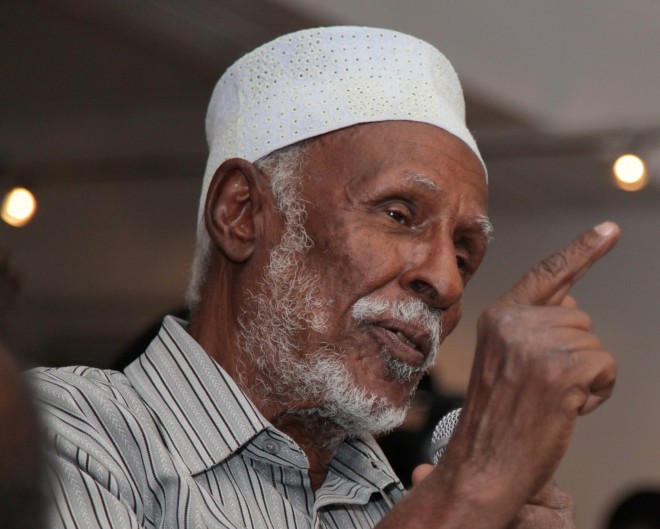
Thursday, January 7, 2016

advertisements
“Whenever the legendary Maxamed Ibraahin Warsame ‘Hadraawi’ described as the greatest living Somali poet, walked from the conference hall, he was mobbed by the crowd.” That’s how I annotated my essay when I first met Hadraawi in Djibouti in 2012.I would sue for an interview. But it was difficult to get Hadraawi that day, as the frenzied mob threw a cauldron around him, taking ‘selfies’ with the legend, when the phenomenon was not so much in vogue.
A student at the University of Djibouti who knew me as one of a handful of literary journalists covering the conference on the 40th anniversary of Somali Language Script, scrapped me through to Hadraawi, who stopped to hear my plea; it was drowned in the cacophony! However, Hadraawi took my notebook, and in there, using his pen, left a squiggle, a symbol, an image, or was it an autograph? And that was Hadraawi, instructive!
Maxamed Ibraahin Warsame, ‘Hadraawi’ was born in 1943 into a nomadic, camel-herding family in Burao District in Somaliland. He attended his Koranic lessons, madrassa, in the famous port city of Aden. It was here that the future great poet showed his prowess as an entrancing storyteller, to be admired.
Young “Hadraawi would seize any opportunity availed to him by his teacher’s short absence and gather his classmates around him, entertaining them with his recitations of traditional Somali folk tales which he had amassed in his childhood, sometimes with the addition of his own stories for extra flavour.” His Koranic teacher took notice, and nicknamed him, “Hadraawi,” – the big talker. Thus, the legend was born. Hadraawi went ahead to study at St Anthony High School for his secondary education, and thereafter proceeded to Lafole Teachers Education College, near Mogadishu.
When I met Hadraawi, there was no doubt that he was both famous and great. Yet I could not lay my hands on his poetry in English, most of which was only available in his native Somali language. What I did not know was that Dr Jama Musse Jama, the director of Hargeysa International Book Fair, had embarked on a project of availing the rich Somali literature to the world, with the concomitant signification of Hadraawi, “to document the life and poetry of one of the greatest living Somali poets and thinkers.” Hence, the bilingual (Somali/English) publication of Hadraawi:
The Poet and the Man (2013) Volume I. It was done by a group of translators led by English poet WN Herbert, English linguist Dr Martin Orwin of the School of Oriental and African Studies (SOAS). The translators worked under the auspices of the UK Poetry Translation Centre. This exemplary literary project will stand the test of time as a counterpoise to the dominant narrative that presents the Somali, only, as a “terrorist, pirate, failure.”
Call him a thinker, a philosopher, an intellectual, a revolutionary, a critic, a teacher, at every turn in the checkered history of his homeland, Hadraawi has delighted his people with his striking poetry, and his clarity of vision, speaking truth to power when the occasion demanded, joining the guerrilla movement to fight in the trenches, fleeing into exile in the UK, where he became so depressed and would turn down persistent requests to seek political asylum. Hadraawi returned home instead.